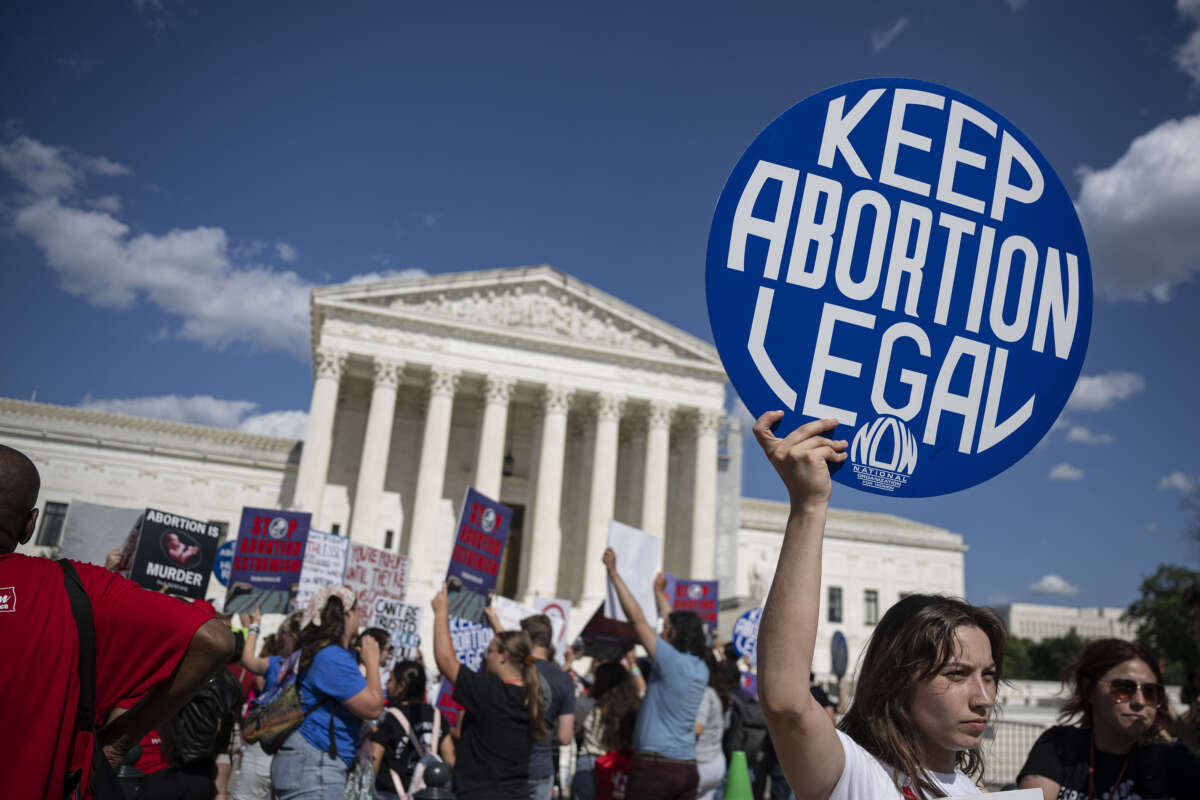Did you know that Truthout is a nonprofit and independently funded by readers like you? If you value what we do, please support our work with a donation.
The Supreme Court will allow Idaho hospital physicians to provide abortions when they are needed in medical emergencies, the court ruled Thursday, in an opinion that was briefly made public Wednesday and reported by Bloomberg.
The writing represents a meaningful — if temporary — victory for health care providers. The court has dismissed the case and returned it to lower courts for further litigation. This would lift a temporary stay the Supreme Court had previously issued on a lower court ruling, which blocked the 1986 Emergency Medical Treatment and Labor Act, known as EMTALA, from applying to abortions in Idaho.
The case concerns whether EMTALA trumps individual state abortion bans. The law requires that hospitals participating in the federal Medicare program provide patients at the emergency room with necessary treatment, regardless of their ability to pay. The Department of Justice has argued that the law requires hospitals to provide abortion in cases where doctors determine it is the needed emergency treatment — and that in those cases, the federal law supersedes state bans.
The court did not weigh in on the specific legal question of whether EMTALA trumps state abortion bans. But for now, it allows physicians in Idaho to provide abortions in a narrow set of circumstances. Dismissing a case after agreeing to take it up is highly unusual.
President Joe Biden, who has made abortion rights a central plank of his re-election bid, praised the ruling.
“Today’s Supreme Court order ensures that women in Idaho can access the emergency medical care they need while this case returns to the lower courts,” Biden said in a statement. “No woman should be denied care, made to wait until she’s near death, or forced to flee her home state just to receive the health care she needs. This should never happen in America.”
In an opinion that was part concurrence and part dissent, Justice Ketanji Brown Jackson, one of the court’s liberal members, said the decision left major legal questions unresolved while delaying clarity for health care providers and patients in Idaho.
“But how long must pregnant patients wait for an answer? Until we confront the pending petition that the Government filed with us after the Fifth Circuit enabled Texas’s flouting of EMTALA? Until these very cases return to us in a few years?” Jackson wrote.
Samuel Alito, once of the court’s conservative members, echoed those criticisms in a dissent, arguing that the Supreme Court has all the information it needs already to rule on the relationship between EMTALA and state abortion laws.
“That question is as ripe for decision as it ever will be. Apparently, the Court has simply lost the will to decide the easy but emotional and highly politicized question that the case presents. That is regrettable,” he wrote.
Indeed, the ruling’s impact could be short-lived. The case will now proceed at the U.S. Court of Appeals for the Ninth Circuit. But it depends on the federal Department of Justice continuing to argue that EMTALA does protect abortions in limited circumstances, a legal interpretation put forth by the Biden administration. Former advisers to GOP nominee Donald Trump have argued that if Trump wins the White House in this November’s election, his administration should rescind that policy.
Most abortions are not performed because of medical emergencies. While this case has been before the high court, physicians in Idaho have flown patients to Utah — the next closest state with abortion access — to receive treatment.
In the wake of Roe v. Wade’s 2022 overturn, EMTALA emerged as one of the few federal options to undercut state abortions bans. Dozens of complaints have been filed against hospitals in states with abortion bans, where patients say they were denied care in pregnancy-related emergencies in violation of the federal law.
Practically, those complaints have had limited impact. The government has issued few penalties to these hospitals and has rejected some of the complaints. But the law’s presence has offered at least some reassurance to hospital health care providers faced with caring for pregnant patients in medical emergencies.
Physicians across specialties urged the court to find in favor of the federal government, arguing that without EMTALA’s protection, patients would be unable to get vital health care in dire situations, including miscarriage, stroke and preeclampsia.
“If someone is having a crisis and part of the treatment involves an abortion — or any procedure or intervention that might be deemed an abortion by a prosecutor down the road — that is something we shouldn’t have to think about,” said Dr. Rob Davidson, a Michigan-based emergency physician, previously told The 19th. “When I have a pregnant woman having a crisis, my first call should be to an OB, and not a lawyer.
A terrifying moment. We appeal for your support.
In the last weeks, we have witnessed an authoritarian assault on communities in Minnesota and across the nation.
The need for truthful, grassroots reporting is urgent at this cataclysmic historical moment. Yet, Trump-aligned billionaires and other allies have taken over many legacy media outlets — the culmination of a decades-long campaign to place control of the narrative into the hands of the political right.
We refuse to let Trump’s blatant propaganda machine go unchecked. Untethered to corporate ownership or advertisers, Truthout remains fearless in our reporting and our determination to use journalism as a tool for justice.
But we need your help just to fund our basic expenses. Over 80 percent of Truthout’s funding comes from small individual donations from our community of readers, and over a third of our total budget is supported by recurring monthly donors.
Truthout has launched a fundraiser to add 340 new monthly donors in the next 5 days. Whether you can make a small monthly donation or a larger one-time gift, Truthout only works with your support.
